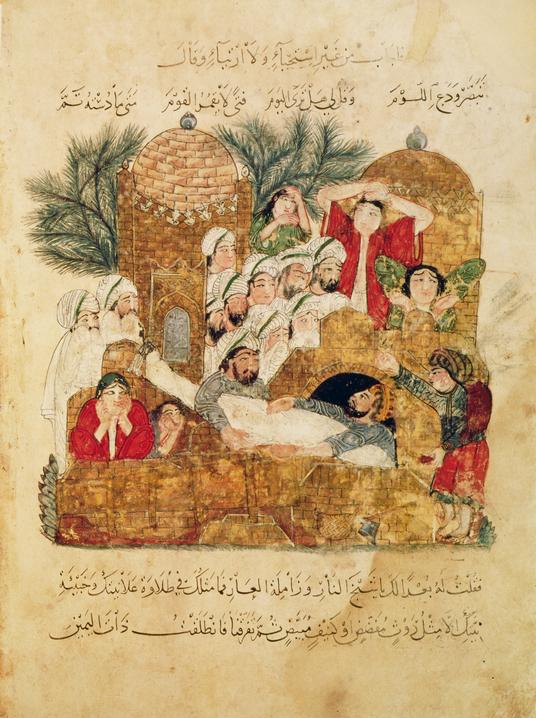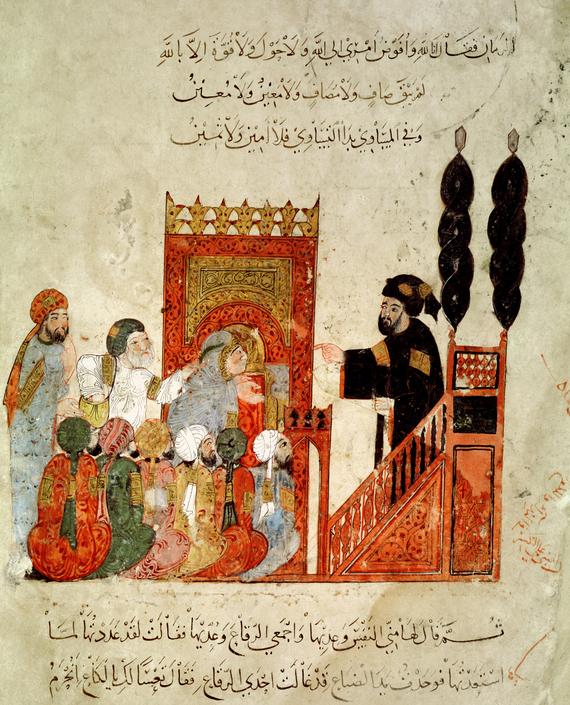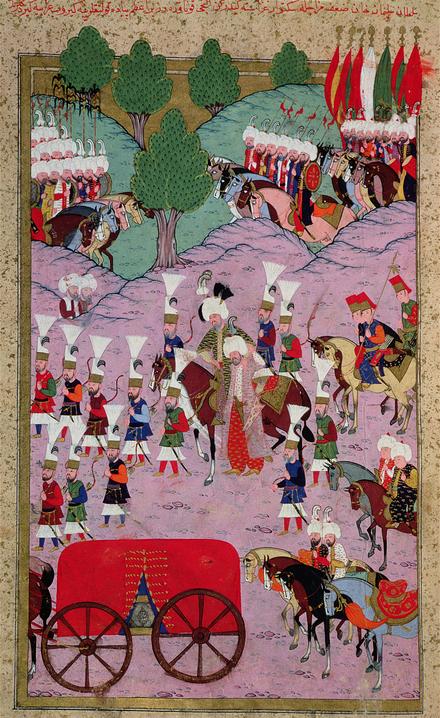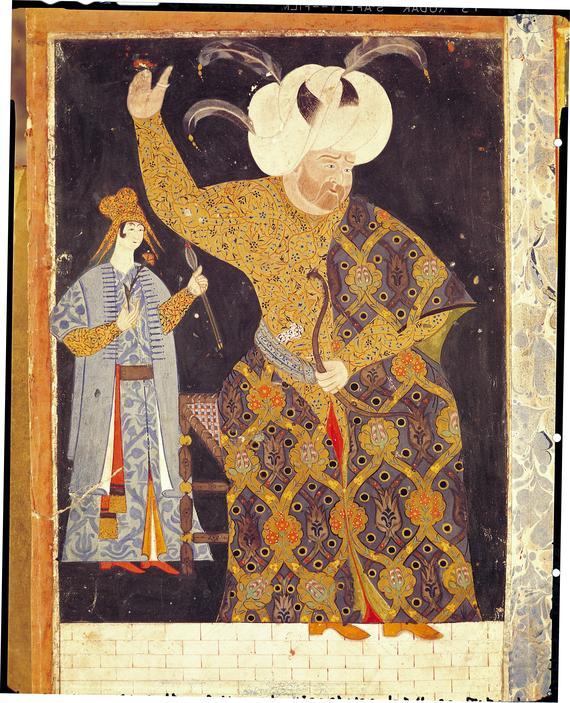One day in the Moslem year 756, or 1355 A.D. , a well known Moroccan theologian began to dictate his memoirs. Better known as Ibn Battuta, he was fifty-one, a scholar and a well respected judge, but principally known as a traveler. In fact he was the best traveled man on earth, having logged an incredible 75,000 miles throughout all the realms of the Islamic civilization and beyond, unique among men of his age.

Burial of a Plague victim. Read More:http://www.artfinder.com/user/6856/collection/indian-persian-miniatures/?_view=two&page=31
Even his narrative, only begins to unfold the scope, excitement and variety of Ibn Battuta’s travels . He was the traveler par excellence, the born wanderer, to whom new scenes, new faces, new experiences were the breath of life. Restless, volatile, emotional, rather greedy, not very profound, distinctly pleased with himself, he nevertheless possessed all the attributes of the good traveler. He was endlessly curious. He was not easily offended. He never pretended to be anything but waht he was, a gentleman and scholar of Maghreb. He relished the pleasures of travel and forgot the miseries unless they were interesting. He was adept at generalization, essential to the art of traveling.

Abou Zayd preaching in the mosque. Read More:http://www.artfinder.com/user/6856/collection/indian-persian-miniatures/?_view=two&page=31
Trained to egalitarianism by Islam, he still had a keen eye for the main chance and the princely munificence. He was generous. He was tough. Above all he possessed the gift of serendipity and stumbled through life from one astonishment to another- from the mythical elephant-eating bird called the roc, for example, to the tree in Ceylon, whose leaves never withered, but around whose trunk, a community of holy men had settled, waiting year in and year out, autumn after autumn, for the day those leaves would fall.
Sometimes he was rich and influential, sometimes he was destitute, sometimes a political grandee attended by many followers and possessing so many horses, he once remarked, that he dare not mention the number “in case some sceptic should call me a liar.” Here we see him as chief justice of the Maldives, ruthlessly performing the morals of the islanders but plotting to overthrow the regime with the help of the king of Coromandel. Here on the beach of Calicut, he abjectly watches a renegade junk sail away with all his possessions, leaving him with only one enfranchised slave boy- ” and when he saw what had happened he deserted me, and I had nothing left at all except ten dinars and the carpet I had slept on.”

---The army of Suleyman the Magnificent. Read More:http://www.artfinder.com/user/6856/collection/indian-persian-miniatures/?_view=two&page=31
Here he is welcomed with honor to the tents of the khan of the Golden Horde, a vast mobile city with its own mosques and bazaars, its ceremonial Golden Pavilion, its thousands of horses and wagons, and the smoke perpetually rising from its hundreds of kitchens. Here, on the other hand, stripped of sandals, turban and sash, he sits on the ground somewhere south of Delhi waiting to be hanged by the brigands who have captured him and placed at his feet the hempen rope of execution. When he arrived at Delhi with his entourage of forty persons , the sultan gave him a welcoming gift of a furnished house, two thousand silver dinars, large quantities of meat, sugar,ghee, nuts, and betel leaves, and the annual revenue of several villages. When he arrived in Malli, in West Africa, with an entourage of five, the sultan gave him a welcoming gist of three cakes, a piece of fried beef, and a calabash of sour curds.

Sultan Salim II. Read More:http://www.artfinder.com/user/6856/collection/indian-persian-miniatures/?_view=two&page=30
This is at least how he tells it all. Nobody ever described Ibn Battuta himself, and only two contemporary works were said to have made reference to him, neither very flattering. His stories, were often, like Marco Polo’s, greeted with reserve. Perhaps some people distrusted his memory, which must have indeed been remarkable.
Others took him for a plain liar, flatly disbelieving his tales about the monkey chief
Ceylon, who lean on staves of office and are attended by monkey courtiers, or his eye witness accounts of the Indian rope trick, of roosters as big as ostriches, rats bigger than cats, or his houses made of fish bones in the Kuria Muria Islands.
…( see link at end) …Here begins Ibn Battuta’s travels p. 43
I left Tangier, my birthplace, on Thursday, 2nd Rajab 725 [June 14, 1325], being at that time twenty-two years of age [22 lunar years; 21 and 4 months by solar reckoning], with the intention of making the Pilgrimage to the Holy House [at Mecca] and the Tomb of the Prophet [at Medina].
I set out alone, finding no companion to cheer the way with friendly intercourse, and no party of travellers with whom to associate myself. Swayed by an overmastering impulse within me, and a long-cherished desire to visit those glorious sanctuaries, I resolved to quit all my friends and tear myself away from my home. As my parents were still alive, it weighed grievously upon me to part from them, and both they and I were afflicted with sorrow. …
…Some time later the pilgrim caravan for the Hijaz was formed, and they nominated me as their qadi [judge]. We left Tunis early in November [1325], following the coast road through Susa Sfax, and Qabis, where we stayed for ten days on account of incessant rains. Thence we set out for Tripoli, accompanied for several stages by a hundred or more horsemen as well as a detachment of archers, out of respect for whom the Arabs [brigands] kept their distance.
I had made a contract of marriage at Sfax with the daughter of one of the syndics at Tunis, and at Tripoli she was conducted to me, but after leaving Tripoli I became involved in a dispute with her father, which necessitated my separation from her. I then married the daughter of a student from Fez, and when she was conducted to me I detained the caravan for a day by entertaining them all at a wedding party. …
…Arrival in Cairo pp. 50-55.
I arrived at length at Cairo, mother of cities and seat of Pharaoh the tyrant, mistress of broad regions and fruitful lands, boundless in multitude of buildings, peerless in beauty and splendour, the meeting-place of comer and goer, the halting-place of feeble and mighty, whose throngs surge as the waves of the sea, and can scarce be contained in her for all her size and capacity. It is said that in Cairo there are twelve thousand water-carriers who transport water on camels, and thirty thousand hirers of mules and donkeys, and that on the Nile there are thirty-six thousand boats belonging to the Sultan and his subjects which sail upstream to Upper Egypt and downstream to Alexandria and Damietta, laden with goods and profitable merchandise of all kinds. …
…At the station of Qatya customs-dues are collected from the merchants, and their goods and baggage are thoroughly examined and searched. There are offices here, with officers, clerks, and notaries, and the daily revenue is a thousand gold dinars. No one is allowed to pass into Syria without a passport from Egypt, nor into Egypt without a passport from Syria, for the protection of the property of the subjects and as a measure of precaution against spies from Iraq. The responsibility of guarding this road has been entrusted to the Badawin [Bedouin]. At nightfall they smooth down the sand so that no track is left on it, then in the morning the governor comes and looks at the sand. If he finds any track on it he commands the Arabs to bring the person who made it, and they set out in pursuit and never fail to catch him. He is then brought to the governor, who punishes him as he sees fit. The governor at the time of my passage treated me as a guest and showed me great kindness, and allowed all those who were with me to pass. From here we went on to Gaza, which is the first city of Syria on the side next the Egyptian frontier….
…One of the principal Hanbalite doctors at Damascus was Taqi ad-Din Ibn Taymiya, a man of great ability and wide learning, but with some kink in his brain. The people of Damascus idolized him. He used to preach to them from the pulpit, and one day he made some statement that the other theologians disapproved; they carried the case to the sultan and in consequence Ibn Taymiya was imprisoned for some years. While he was in prison he wrote a commentary on the Koran, which he called ” The Ocean,” in about forty volumes. Later on his mother presented herself before the sultan and interceded for him, so he was set at liberty, until he did the same thing again. I was in Damascus at the time and attended the service which he was conducting one Friday, as he was addressing and admonishing the people from the pulpit. In the midst of his discourse he said “Verily God descends to the sky over our world [from Heaven] in the same bodily fashion that I make this descent,” and stepped down one step of the pulpit. A Malikite doctor present contradicted him and objected to his statement, but the common people rose up against this doctor and beat him with their hands and their shoes so severely that his turban fell off and disclosed a silken skull-cap on his head. Inveighing against him for wearing this, they haled him before the qadi of the Hanbalites, who ordered him to be imprisoned and afterwards had him beaten. The other doctors objected to this treatment and carried the matter before the principal amir, who wrote to the sultan about the matter and at the same time drew up a legal attestation against Ibn Taymiya for various heretical pronouncements. This deed was sent on to the sultan, who gave orders that Ibn Taymiya should be imprisoned in the citadel, and there he remained until his death. …Read More:http://www.fordham.edu/halsall/source/1354-ibnbattuta.asp








 COMMENTS
COMMENTS



